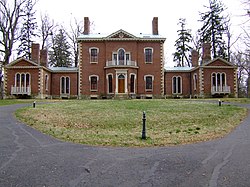Ashland (Henry Clay home)
|
Ashland
|
|

A view of the front of the house
|
|
| Location | 120 Sycamore Road Lexington, Kentucky |
|---|---|
| Coordinates | 38°1′43″N 84°28′48″W / 38.02861°N 84.48000°WCoordinates: 38°1′43″N 84°28′48″W / 38.02861°N 84.48000°W |
| Built | 1811 |
| Architect | Benjamin H. Latrobe; Thomas Lewinski |
| Architectural style | Italianate |
| NRHP Reference # | 66000357 |
| Added to NRHP | October 15, 1966 |
Ashland is the name of the plantation of the 19th-century Kentucky statesman Henry Clay, located in Lexington, Kentucky, in the central Bluegrass region of the state. It is a registered National Historic Landmark. The Ashland Stakes, a Thoroughbred horse race at Keeneland Race Course that has run annually since the race course first opened in 1936, was named for the historically important estate.
Henry Clay came to Lexington, Kentucky from Virginia in 1797. He began buying land for his plantation in 1804.1 The Ashland farm—which during Clay's lifetime was outside of the city limits—at its largest consisted of over 600 acres (240 ha). It is unclear whether Clay named the plantation or retained a prior name, but he was referring to his estate as "Ashland" by 1809.2 The name derives from the ash forest that stood at the site. Clay and his family resided at Ashland from c. 1806 until his death in 1852 (his widow Lucretia Clay moved out in 1854). Given his political career, Clay spent most of the years between 1810 and 1829 in Washington, DC. He was a major planter, owning up to 60 slaves to operate his plantation.
Among the slaves were Aaron and Charlotte Dupuy, and their children Charles and Mary Ann. Clay took them with him to Washington, DC. Their lives have recently gained new recognition in an exhibit at the Decatur House, where they served Henry Clay for nearly two decades. In 1829, 28 years before the more famous Dred Scott challenge, Charlotte Dupuy sued Henry Clay for her freedom and that of her two children in Washington circuit court. She was ordered to stay in Washington while the court case proceeded, and lived there for 18 months, working for Martin Van Buren, the next Secretary of State. Clay took Aaron, Charles and Mary Ann Dupuy with him when he returned to Ashland. When the court ruled against Dupuy and she would not return voluntarily to Kentucky, Clay's agent had her arrested. Clay had Dupuy transported to New Orleans and placed with his daughter and son-in-law, where she was enslaved for another decade. Finally in 1840 Clay freed Charlotte and Mary Ann Dupuy, and in 1844 freed her son Charles Dupuy.
...
Wikipedia


